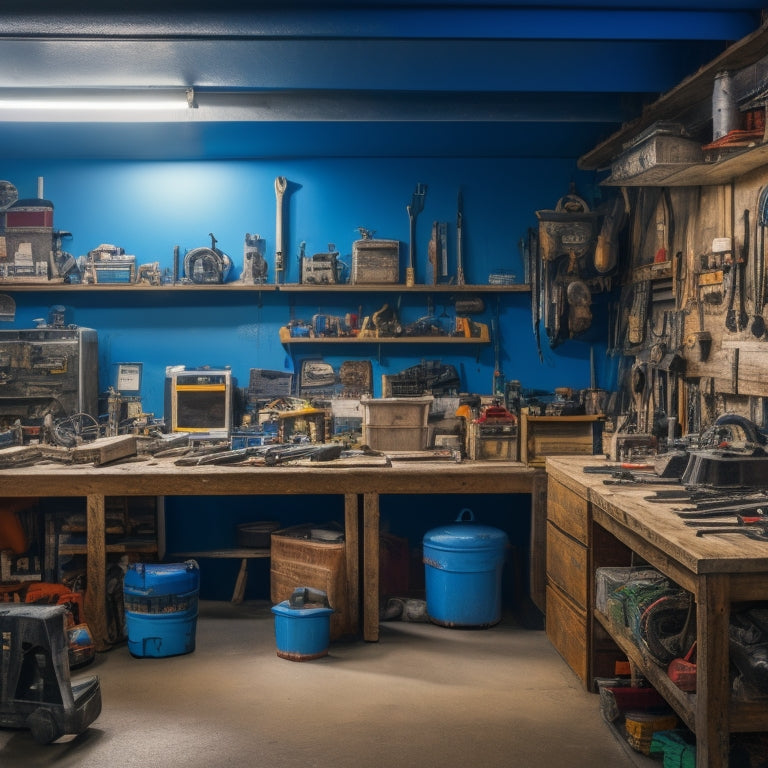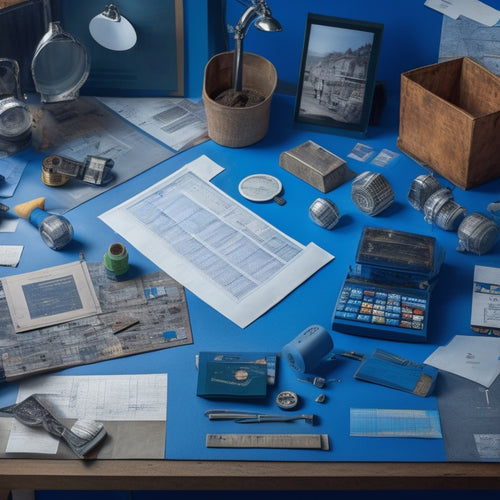
Renting the Right Tools for Your Home Renovation
Share
When it comes to your home renovation project, renting the right tools can be a game-changer. Not only does it reduce upfront costs, but it also provides access to the latest models and top brands, while eliminating long-term storage needs. You'll need to assess your equipment needs and budget to determine the most cost-effective and efficient approach. Consider factors like project timelines, storage, and maintenance requirements, as well as the frequency of use. By doing so, you'll be able to make informed decisions about what to rent and for how long, setting yourself up for a successful and profitable renovation - and there's more to explore on this topic.
Key Takeaways
• Assess equipment needs and budget to determine the most cost-effective rental options for your home renovation project.
• Consider the rental duration and calculate daily rates to avoid overspending and stay within your budget.
• Choose the right drill and accessories, such as cordless or hammer drills and suitable drill bits, for your specific tasks and materials.
• Ensure safety during drilling operations by wearing protective gear, clearing the work area, and having emergency equipment accessible.
• Evaluate rental companies and factor in additional costs, such as maintenance and delivery fees, to make an informed decision.
Benefits of Renting Drilling Equipment
By opting to rent drilling equipment, you can considerably reduce your upfront costs and allocate that budget to more critical aspects of your home renovation project. This cost-effective approach allows you to divert funds to other essential areas, such as materials, labor, or design elements.
Renting drilling equipment also guarantees tool availability, as you can access the latest models and top brands without the burden of ownership. This means you can tackle tasks efficiently, without worrying about equipment maintenance or storage.
Additionally, renting eliminates the need for long-term storage, freeing up valuable space in your garage or workshop. With rental options, you can choose the right tool for the job, without committing to a purchase.
This flexibility is particularly useful for one-off projects or tasks that require specialized equipment. By renting drilling equipment, you can enjoy significant cost savings while still achieving professional-grade results.
Choosing the Right Drill Bit
With your drilling equipment rented and ready to go, you'll need to select the right drill bit to tackle your specific task efficiently and effectively. The type of drill bit you choose will depend on the material you're working with and the task at hand.
Drill bit materials vary, with common options including high-speed steel (HSS), cobalt steel, and tungsten carbide (TC). HSS bits are suitable for wood and metal, while cobalt steel bits are ideal for drilling through hard metals. TC bits, on the other hand, are perfect for drilling through concrete and masonry.
When it comes to drill bit sizes, you'll need to take into account the diameter and length of the bit. Drill bit sizes range from 1/16 inch to over 1 inch in diameter, with longer bits typically used for deeper holes.
You'll also need to choose between twist bits, spade bits, and hole saws, each designed for specific tasks. By selecting the right drill bit, you'll be able to complete your project quickly and accurately, without damaging your equipment or the material you're working with.
Concrete Drilling Safety Precautions
When drilling into concrete, you'll need to take concrete drilling safety precautions seriously to avoid injuries and damage to your equipment.
Wearing the right safety gear is essential, including a dust mask, safety glasses, earplugs, and a hard hat. Make certain you're wearing durable, long-sleeved clothing and steel-toed boots to protect yourself from debris and falls.
Before starting the drill, verify the area is clear of obstacles and tripping hazards. Keep a fire extinguisher nearby and have a first aid kit on hand in case of emergencies. Establish emergency procedures, such as knowing the nearest hospital and having a phone nearby, in case of an accident.
Keep the drill cord away from water and avoid overreaching or bending, which can cause loss of control. Remember to keep your work area well-ventilated to avoid inhaling concrete dust.
Different Types of Drill Machines
When it comes to choosing the right drill machine for your home renovation project, you'll want to evaluate the specific tasks at hand and the type of power you need.
You'll need to decide whether a cordless drill option is best for you, offering flexibility and convenience, or if a hammer drill is the way to go, with its added force and ability to tackle tough materials.
Cordless Drill Options
You're likely to encounter several cordless drill options on the market, each designed to cater to specific drilling needs and preferences.
When choosing the right cordless drill for your home renovation project, consider the battery life and torque settings. Look for drills with high-capacity batteries that provide extended runtime, ensuring you can complete your tasks without interruptions. Torque settings are equally important, as they determine the drill's ability to handle various materials and tasks. Some cordless drills come with adjustable torque settings, allowing you to switch between delicate tasks like drilling small screws and heavy-duty tasks like driving large lag screws.
When evaluating cordless drill options, also consider the chuck size, motor speed, and weight. A 1/2-inch chuck size is ideal for most drilling tasks, while a high motor speed is essential for efficient drilling. A lightweight drill with an ergonomic design will reduce fatigue and improve control.
Additionally, check the drill's accessories, such as the number of batteries included, charging time, and storage case. By considering these factors, you'll find the perfect cordless drill to tackle your home renovation project with ease and precision.
Hammer Drill Uses
Three types of drill machines - hammer drills, rotary hammers, and demolition hammers - are designed to tackle specific tasks that require intense force and precision.
As you plan your home renovation, it's crucial to understand the unique capabilities of each drill type to guarantee you're using the right tool for the job.
Hammer drills, for instance, are perfect for drilling into concrete, brick, or block, making them ideal for installing anchors or screws. When working with hammer drills, remember to perform regular maintenance tasks, such as cleaning the chuck and lubricating the motor, to extend its lifespan. You can also enhance its functionality with hammer drill accessories like drill bits and chisels.
Rotary hammers, on the other hand, are designed for heavy-duty demolition work, while demolition hammers are used for breaking up concrete and asphalt.
Factors to Consider Before Renting
Before diving into a home renovation project, carefully evaluate your equipment needs and budget to determine whether renting tools is the most cost-effective and efficient option for you. You'll want to contemplate your budget considerations, as buying tools outright can be a significant upfront expense. Renting, on the other hand, allows you to allocate funds to specific tasks or phases of the project.
Next, assess your project timelines. Will you need the tools for a short period or throughout the entire renovation? Renting tools for a shorter duration can be more cost-effective than buying them outright.
Additionally, reflect on the storage and maintenance requirements for the tools. If you don't have the space or expertise to store and maintain specialized equipment, renting might be the better choice.
Lastly, think about the frequency of use for each tool. If you only need a specific tool for a one-time task, renting makes more sense than investing in a purchase.
Popular Brands for Concrete Drills
When it comes to tackling concrete drilling tasks in your home renovation project, you'll want to rely on a trusted brand that can deliver power, precision, and durability. Top concrete brands like Bosch, DeWalt, and Makita are popular choices among professionals and DIYers alike. These brands have earned a reputation for producing high-quality drills that can withstand the rigors of concrete drilling.
When choosing a concrete drill, you'll want to take into account factors like drill performance reviews, motor power, and bit compatibility. Look for drills with high torque ratings and adjustable speed settings to make sure you can tackle a variety of drilling tasks. Additionally, take into account the type of concrete you'll be drilling into, as some drills are better suited for certain types of concrete.
Drill performance reviews can also give you valuable insight into a drill's capabilities. Look for reviews from other users who've completed similar projects to get a sense of how a drill performs in real-world scenarios. By choosing a top concrete brand and taking into account these factors, you can make sure you have the right tool for your home renovation project.
Rental Period and Cost Estimates
When you're planning a home renovation project, it's essential to evaluate the rental period and cost estimates for the tools you'll need.
You'll want to understand the factors that influence rental fees, how to calculate daily rates, and how to estimate total costs to avoid surprise expenses.
Rental Fee Factors
How long you plan to rent a tool often greatly impacts the total rental fee, as daily, weekly, or monthly rates can vary greatly depending on the equipment type and rental duration.
For instance, if you're planning a short-term project, daily rates might be the most cost-effective option. On the other hand, if your project spans several weeks or months, weekly or monthly rates may provide better value. It's crucial to evaluate your rental duration carefully to avoid overspending.
Another critical factor affecting your rental fee is equipment maintenance. Some rental companies may include maintenance costs in the initial rental fee, while others may charge extra for repairs or maintenance.
Be sure to ask about maintenance responsibilities and associated costs before signing a rental agreement. Additionally, inquire about any discounts or promotions that may be available for longer rental periods or bulk equipment rentals.
Calculating Daily Rates
You'll need to calculate daily rates to determine the total cost of your tool rental, which involves estimating the rental period and factoring in costs associated with the equipment's usage and maintenance. This step is essential in budget planning, as it helps you allocate funds effectively and avoid overspending.
To calculate daily rates, you'll need to evaluate the rental duration, which can vary depending on the project's scope and timeline.
Developing daily rate strategies involves understanding the equipment's usage patterns and maintenance requirements. For instance, if you're renting a heavy-duty drill, you'll need to factor in the cost of replacement bits and regular servicing.
Be sure to ask your rental provider about any additional fees associated with equipment maintenance and usage. By calculating daily rates accurately, you'll be able to create a thorough budget plan that accounts for all expenses.
This will give you a clear understanding of your project's financial requirements, allowing you to make informed decisions and stay on track.
Estimating Total Costs
Estimating total costs involves accurately determining the rental period and factoring in cost estimates for each tool, which helps you allocate funds efficiently and stay within budget.
To do this, you'll need to calculate the total rental period for each tool, considering the duration of your project and any potential delays. Next, research cost estimates for each tool, taking into account factors like daily rates, delivery fees, and any additional charges.
By comparing costs between different rental companies, you can identify the most cost-effective options for your project. This cost comparison will help you develop effective budgeting strategies, ensuring you stay on track financially. Be sure to also consider the costs of fuel, maintenance, and operator training, if applicable.
Once you have a thorough estimate of total costs, you can adjust your rental plans accordingly. This might involve opting for more affordable tools, negotiating with rental companies, or reassessing your project timeline.
Selecting the Right Drill Attachment
Your drill's versatility hinges on choosing the right attachment, as it can transform this essential power tool into a multipurpose workhorse for a wide range of home renovation tasks.
With various drill attachment types available, it's vital to select the one that suits your specific needs. You'll find attachments for drilling, driving, mixing, and even sanding.
Consider the drill performance factors that matter most to you, such as speed, torque, and precision. For instance, if you're working with dense materials, a high-torque attachment will provide the necessary power. On the other hand, if you're tackling delicate tasks, a low-speed attachment with high precision will guarantee accuracy.
Additionally, think about the type of bits you'll need and whether the attachment is compatible with your drill's chuck size.
What to Expect From Rental Stores
Rental stores typically carry a wide range of home renovation tools and equipment, including specialized drills and attachments that can help you tackle specific tasks more efficiently. When you walk into a rental store, you can expect to find a vast selection of tools and equipment that cater to your specific needs.
Here are some of the services you can expect from a rental store:
-
Tool demonstrations: Many rental stores offer demos of their tools and equipment, so you can get a feel for how they work before you rent.
-
Customer support: Rental store staff are usually knowledgeable about the tools and can offer valuable advice on how to use them effectively.
-
Equipment maintenance: Rental stores typically maintain their equipment regularly, ensuring that you receive tools that are in good working condition.
- Flexible rental periods: Rental stores often offer flexible rental periods, so you can rent tools for a day, a week, or even a month, depending on your project's needs.
Frequently Asked Questions
Can I Rent Tools for a Short Period, Like a Day or Two?
You're wondering if you can rent tools for a short stint, and the answer is yes!
Many equipment rental companies offer daily rental options or short-term leasing agreements that cater to your brief needs.
This way, you can access the tools you need without breaking the bank or committing to a long-term contract.
You'll find that daily rentals are often a cost-effective and convenient solution for small projects or unexpected tasks that pop up.
Are Rented Tools Typically in Good Working Condition?
You'd be surprised to know that 80% of contractors report that equipment maintenance is essential to their business success.
When you rent tools, you can expect them to be in good working condition. Reputable rental companies maintain their tools regularly, and most rental agreements guarantee a certain level of tool quality.
You'll typically find that rented tools are well-maintained, clean, and ready for use, ensuring your project runs smoothly and efficiently.
Do Rental Stores Offer Tool Operation Tutorials or Guidance?
When you rent tools, you'll often find that the staff offers valuable guidance on tool operation and safety. They'll walk you through the rental agreement, explaining how to properly use the equipment and highlighting potential hazards.
Take advantage of this expertise to guarantee you're using the tools correctly and safely. Don't be afraid to ask questions - it's better to be safe than sorry, and the staff is there to support you.
Can I Rent Tools From Online Stores or Only Physical Locations?
You're charting unexplored territories, venturing into the unknown, and the map only shows two paths: online or offline.
Can you rent tools from online stores or only physical locations? The answer is, you can do both!
Online rental platforms offer tool rental convenience, allowing you to browse and book from the comfort of your home.
However, physical stores provide hands-on experience and expert advice.
You choose: the convenience of online or the personalized touch of in-store rentals.
Will I Need to Clean or Maintain Rented Tools Before Return?
When returning rented tools, you'll likely be responsible for their condition.
Be sure to review the rental agreement for specific cleaning expectations and maintenance tips.
Typically, you'll need to wipe down tools, removing any debris or residue, and make certain they're in good working order.
Failure to do so might result in additional fees or penalties.
Take the time to properly clean and maintain the tools to avoid any extra costs.
Conclusion
As you begin your home renovation journey, remember that renting the right tools is like having a trusted navigator by your side.
Just as a skilled sailor knows which charts to read and which winds to harness, you've learned to chart your course through the world of drilling equipment.
With the right drill and bit, you'll be able to break through even the toughest concrete, and emerge victorious, your renovation a masterpiece of precision and skill.
Related Posts
-

Crack Repair Inspection Checklist for Home Renovation
When creating a crack repair inspection checklist for your home renovation project, you'll want to identify crack typ...
-

5 Best Home Renovation Project Timeline Checklists
You're looking for a clear understanding of the timeline for your home renovation project. A good place to start is w...
-

3 Best Planter Shopping Timeline Tips for Renovators
When incorporating planters into your renovation project, you'll want to plan carefully to avoid delays and guarantee...


